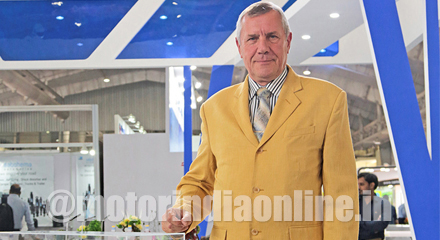Company to announce Indian JV details soon

Belarusian company OJSC Holding Managing Company ‘Belkommunmash’ was one of the star attractions at the show. Though the company displayed only scale models of its products at the fair, its unique name and well lit up pavilion caught the attention of many.
The 45-year-old company is a leading manufacturer of modern urban electric transport vehicles such as trams, trolley buses and electric buses and has set its sight on India given the burgeoning electromobility drive in the market.
Talking exclusively to MOTORINDIA, Mr. Vladimir Korol, CEO, Belkommunmash, said: “We understand through this exhibition that India is advancing in green technology and also that we are just at the beginning of a major transformation. This is good for us because we have huge experience in producing and operating green vehicles such as fully-electric buses. Of course, the Indian market might take a long time to develop a good electric transport ecosystem but we believe, using our expertise and experience in electric buses, we can help make this process shorter. India and Belarus have a very good relationship and we are exploring possibilities of cooperating with Indian companies.”
The company seems to have charted out a clear plan for the Indian market, as revealed by the CEO: “We want to start a JV in India for which we have already found a partner and are currently having discussions to finalize the partnership. After signing the agreement, our target is to produce the first prototype of our electric bus in the next six months. We will start with the city-bus segment but do not plan to just supply vehicles; our aim will be to create a complete ecosystem for electric buses. We think India is at the top of the pack when it comes to use of alternative sources of energy for transport and believe we can contribute a lot to the market.”
Belkommunmash rolled out its first electric bus in 2008, amidst strong criticism from many that the project would not even last “until the next generation” as Mr. Korol worded it. But the company did not pay heed to the naysayers and continued with its efforts that saw it become the first CIS country to supply electric buses that are commercially running successfully.
The company produces its own electric drives and considers its control over production and product quality as a major USP. It has sold over 100 electric buses globally and has some more orders in hand.